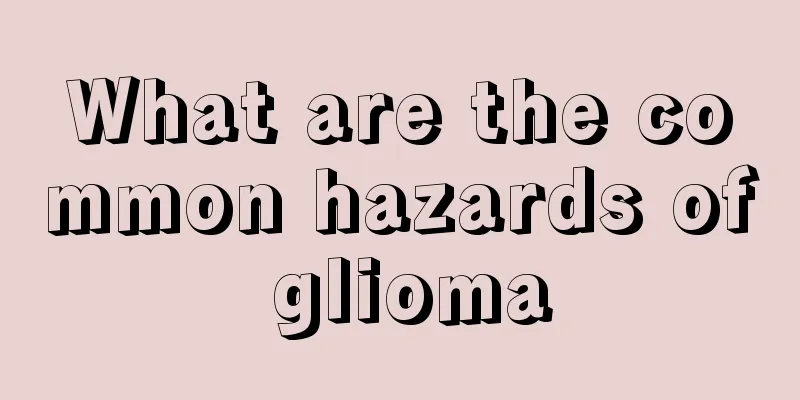What are the common hazards of glioma

|
Glioma is a malignant tumor of the brain. I believe many people know this disease. Once you suffer from this disease, you will suffer from various tortures. Moreover, glioma always recurs repeatedly. Patients have been tortured by the disease and are in great pain. So, what are the common hazards of glioma? 1. Headache: In the early stage, it is often intermittent, throbbing dull pain or distending pain. Later, as the tumor grows, the headache intensifies and lasts longer, and can become continuous. The headache can be localized or general, often occurring in the early morning or on an empty stomach after getting up, and gradually relieved during the day. In severe cases, it may be accompanied by nausea and vomiting, and the headache can be relieved after vomiting; 2. Vomiting is also often the first symptom of glioma, which often occurs in the early morning on an empty stomach. There may or may not be nausea before vomiting, and it is often accompanied by severe headache and dizziness. Sometimes it is jet-like, mostly caused by increased intracranial pressure stimulating the vomiting center. Children with posterior cranial fossa tumors will have early and frequent vomiting, which is often the only early symptom and can be easily misdiagnosed as a gastrointestinal disease; 3. Papilledema is an important objective sign of increased intracranial pressure. Supratentorial tumors are generally heavier on the tumor side, while infratentorial tumors are roughly connected on both sides. Tumors at the base of the frontal lobe directly compress the ipsilateral optic nerve, causing primary atrophy. Countermeasures for papilledema caused by increased intracranial pressure Papilledema may not affect vision for a long time. As papilledema worsens, the physiological blind spot expands, the visual field shrinks concentrically, and the optic disc atrophies secondary to it. Once paroxysmal amaurosis occurs, vision will decline rapidly. Be alert to the risk of blindness and deal with it early; 4. Epilepsy attacks are mostly caused by direct stimulation or compression of the tumor, with an incidence of about 30%. Generally, slow-growing low-grade gliomas such as astrocytomas and oligodendrogliomas have epilepsy as the first or main symptom, while fast-growing malignant glioblastomas have a low incidence of epilepsy; 5. Neurological localization symptoms caused by tumor stimulation, compression or destruction of surrounding brain tissue or cranial nerves, such as frontal lobe glioma can cause damage to the motor area, writing and motor language center, etc., parietal lobe glioma can cause cortical sensory disorders, apraxia, alexia and calculation disorders, etc. Temporal lobe glioma can cause tinnitus and auditory hallucinations, sensory or nomenclature aphasia, vertigo, etc. The above is an introduction to the harmful manifestations of brain glioma. It can be seen how serious it is. Therefore, early detection and early treatment are the key to treating brain glioma. |
<<: What are the dangers of glioma
>>: What are the benign symptoms of tongue cancer
Recommend
The ratio of sodium bicarbonate for treating thrush
Thrush is a type of oral disease that mainly affe...
What should be done before percutaneous interventional treatment of liver cancer? Be prepared
When patients with liver cancer undergo percutane...
What to eat on the beginning of spring, spring plate and spring pancake
The Beginning of Spring is the beginning of sprin...
Can Panax notoginseng powder cure constipation?
People with constipation have big problems in the...
Characteristics of hematuria caused by urinary system tumors
Some people will have blood in their urine, which...
Early symptoms and precursors of rectal cancer
Early symptoms and signs of colorectal cancer inc...
How long does it take to supplement calcium during pregnancy?
Expectant mothers during pregnancy often experien...
What should you eat when you stay up late to supplement vitamin A
Although everyone knows that staying up late is v...
What symptoms of blood dryness require high attention
The disease phenomenon of blood dryness seriously...
How to store brown sugar
Brown sugar is very common in life, and its uses ...
Symptoms of atrial fibrillation, manifestations that cannot be ignored
Atrial fibrillation is a common type of arrhythmi...
What are the acupuncture points for improving memory
Our memory is affected by many factors. For examp...
Fatigue and anemia are usually symptoms of colorectal cancer
Fatigue and anemia are usually symptoms of colore...
How to prevent food poisoning, 10 ways to protect your health
Food poisoning poses a great threat to human heal...
Plastic surgery to remove wrinkles from the eyes
Eye wrinkle removal surgery is a method of facial...









